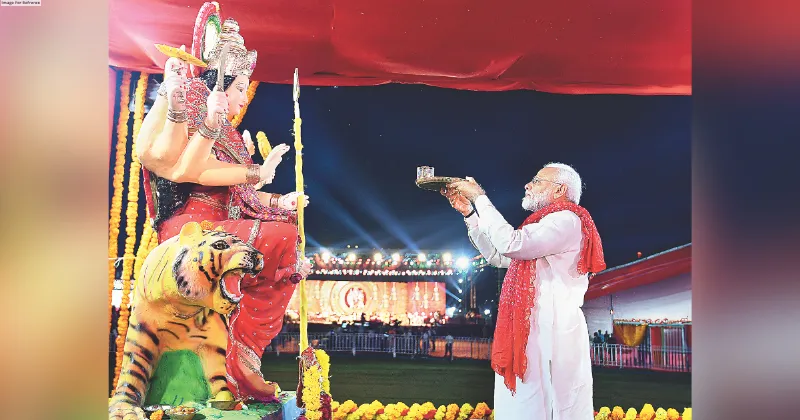Latest News
TRANSCENDING THE THREE GUNAS THIS NAVRATRI

The nine days of Navratri are a wonderful opportunity to rejoice and transcend the three primordial qualities that make up the universe. Though our life is governed by the three gunas, we never take out the time to recognize and reflect on them.
The three primordial gunas are considered as part of Shakti or the feminine force in this creation. When we worship the Mother Divine during Navratri, we harmonize these three gunas and raise sattva in the atmosphere. The first three days of Navratri are attributed to tamo guna or the dark, dense, heavy aspect of the existence, the following three days are related to rajo guna that represents activity or restlessness and the last three days pertain to sattva guna or purity. Our consciousness moves through the tamo and rajo gunas and blossoms in the sattva guna in the last three days. We take this journey during these nine days and nights through fasting, prayer, silence and meditation to get back to our true source; which is love, joy and peace. Whenever sattva dominates in life, victory is sure to follow. The essence of this knowledge is honored by celebrating the tenth day as Vijaydashmi.
The three gunas are transcended by the worship of the three forms of mother divine during the nine days. Goddess Durga is invoked first; praying to whom removes impurities from the mind. This way, we begin with winning over the tendencies of the mind like cravings, aversions, pride, and greed. Once we have subdued these negative tendencies and patterns, we move ahead on the spiritual path to nurture and strengthen your positive qualities. Goddess Lakshmi is prayed to, for nurturing these noble values and qualities in our hearts and minds. And in the last three days, Goddess Saraswati in her various forms is propitiated for gaining the highest knowledge of the Self, when sattva remains high.
OFFERINGS AS A SYMBOL OF GRATITUDE
We offer flowers and fruit to Mother Divine during these auspicious days. But the flower truly represents human blossoming, who we are - so full, charming and so light - so beautiful. Fruits symbolize completeness or totality. In the life cycle of a plant, fruits denote completeness, or fullness, just how we feel when we offer the symbolic fruit as prasad to Mother Divine God with all the gratitude. We also light lamps. In the Indian tradition, we use tall brass lamps with a swan carving on the top, which has a beautiful meaning. In Sanskrit verses, a swan is said to be blessed with ‘Neerakshiraviveka’ meaning it can differentiate between milk and water even though both may be mixed.
THE BEAUTY OF YAGYAS
Ancient Sanskrit mantras chanted during yagyas performed during these nine days, have a deeply purifying and uplifting impact on the consciousness. More than the words, it is about becoming one with the vibrations. Although we may not entirely understand the meaning of all the verses chanted during the homas or ceremonies which are performed during Navaratri, we should simply soak in the meditative, positive and auspicious vibrations created through the chants in the environment. Yagnas, when performed with utmost purity and devotion, bestow all the beings with freedom from all the misery, sorrow, and pain in the world and brings peace, strength, prosperity, success and faith - which by itself, is the best blessing.
The ninth day is a day to honor everything that we have, from all that is grand to what is seemingly insignificant, through homa offerings. The entire creation comes alive and we begin to recognize the impulse of Mother Divine in everything just as children see life in everything. The Mother Divine or the pure consciousness pervades all the forms, showering the creation with her blessings.
Recognizing the one divinity in every form and every name is the celebration of Navratri. The tenth day is ‘Vijaya Dashmi’ the ‘victory day’. It is only after we have honored something that we can gain victory over it. It is usually celebrated as victory of good over evil but that is a limited way of looking at it. From the Vedantic viewpoint, victory is of the absolute reality over the seeming duality. The great sage Ashtavakra says- ‘it is merely the poor wave that tries to keep its identity separate from the ocean, but to no avail.’
THE VIEWS EXPRESSED BY THE AUTHOR ARE PERSONAL
SRI SRI RAVI SHANKAR The writer is an Indian yoga guru, a spiritual leader, founder of The Art of Living





















